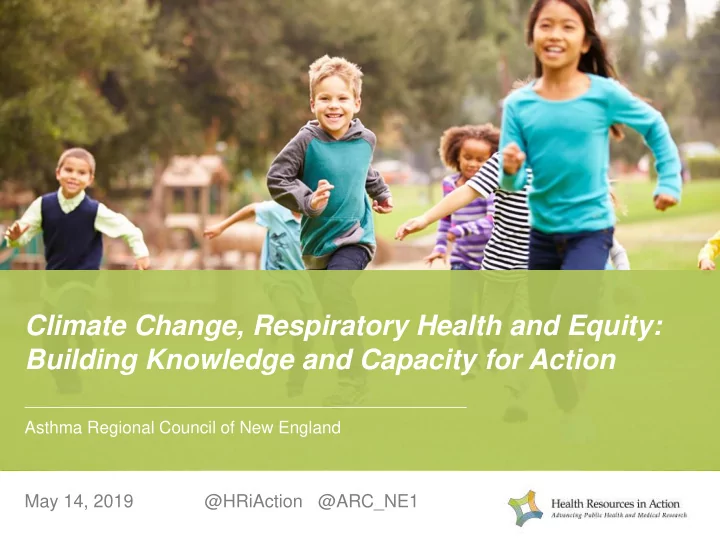

Climate Change, Respiratory Health and Equity: Building Knowledge and Capacity for Action Asthma Regional Council of New England May 14, 2019 @HRiAction @ARC_NE1
Summit Purpose Build knowledge Illuminate bright spots about links between – particularly protecting respiratory health and our regions most climate change vulnerable populations Dialogue about how Increase capacity for we can better address collaboration to reduce climate change, and climate change & promote equity promote climate resilient communities. 2
Health equity 3
Negative health outcomes… Behavior Cancer Asthma problems Depression COPD Stroke Heart disease Obesity Hypertension Injury Diabetes
Negative health outcomes… influenced by health behaviors… Behavior Cancer Asthma problems Depression COPD Stroke Heart disease exercise Obesity Hypertension Injury Diabetes
Negative health outcomes… influenced by health behaviors… shaped by the social determinants of health… Behavior Cancer Asthma problems Depression COPD Stroke Heart disease exercise Obesity Hypertension Air quality Injury Access to employment Education Diabetes Affordable housing Neighborhood safety Homelessness Physical condition of home Food Health services Health care Places to be physically active Childcare Transportation
Negative health outcomes… influenced by health behaviors… shaped by the social determinants of health… created and perpetuated by root causes of inequities Behavior Cancer Asthma problems Depression COPD Stroke Heart disease exercise Obesity Hypertension Air quality Injury Access to employment Education Diabetes Affordable housing Neighborhood safety Homelessness Physical condition of home Food Health services Health care Places to be physically active Childcare Transportation & institutional barriers Classism
What is health equity? Health equity means that everyone has a fair and just opportunity to be as healthy as possible. To achieve this, we must remove obstacles to health — such as poverty, discrimination, and deep power imbalances — and their consequences, including lack of access to good jobs with fair pay, quality education and housing, safe environments, and health care. Source: Human Impact Partners, Health Equity Guide https://healthequityguide.org/about/defining-health-equity/ Adapted from: Braveman P, Arkin E, Orleans T, Proctor D, and Plough A. What Is Health Equity? And What Difference Does a Definition Make? Princeton, NJ: Robert Wood Johnson Foundation, 2017 8
Institutional and structural racism Refers to the policies and practices of Institutional organizations (education, transportation, racism housing, healthcare, etc.) that create different outcomes for different racial groups. Refers to the totality of ways in which societies Structural foster racial discrimination through mutually racism reinforcing systems of housing, education, employment, earnings, benefits, credit, media, health care, and criminal justice. These patterns and practices in turn reinforce discriminatory beliefs, values, and distribution of resources. 9 Z. Bailey, et al - “Structural racism and health inequities in the USA: evidence and interventions”
Health equity – upstream approach
Equity framework Challenge assumptions and narratives about what promotes and hinders health Create and sustain authentic and diverse engagement Strengthen capacity to correct power imbalances and address inequities
Thank you Co-Sponsors Environmental Protection Agency , Region One Asthma Prevention and Control Programs at the: • Connecticut DPH • Maine DHHS • Massachusetts DPH • New Hampshire DHHS • Rhode Island DOH • Vermont DOH 12
Short Films Our Climate Our Future Asthma Alley Fuel Change Anthem 13
Introductions & Sectors Represented • Community Based, Environmental & Advocacy • Public Health – Local and State • Environmental Protection – Federal & State • Clinicians • Academics/Research • Energy Conservation • Housing • And More! 14
Short Films Our Climate Our Future Asthma Alley Fuel Change Anthem 15
Small Group Discussion Discussion: (20 minutes): o Name one to three feasible actions that you could take immediately – collaboratively and/or on your own. Consider: ▪ Assets/opportunities ▪ Partnerships ▪ Challenges ▪ Fit with your current work. Table Report out: Share ideas (15 minutes) 16
Short Films Our Climate Our Future Asthma Alley Fuel Change Anthem 17
Small Group Discussion Individual reflection (10 minutes) Small Group discussions (30 minutes) • How can you work across sectors to help ensure that TCI has a strong equity agenda? • What organizations or communities need to be at the table? • What can we do to uplift voices of frontline communities? • Ideas to push your work more upstream to address climate resilience and/or respiratory health upstream? Share with Group (25 minutes) • 0ne or two big takeaways. 18
Thanks for Your Participation! Evaluations Wrap-up 19
Recommend
More recommend